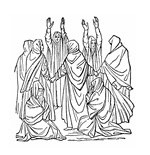
The Penitent Pigeon
A SHORT STORY
Ss. Pelagia & Nonnus. Antioch, Late 400s
“Bishop Nonnus! Look what I found!”
Nonnus, thrown off his stride, broke off speaking in mid-sentence, and looked around. He was sitting on the portico of the basilica of St. Julian the Martyr along with several other bishops whom he had been addressing. The street was bustling — Antioch was always bustling — and at first he didn’t sight the source of the voice.
“Bishop Nonnus!”
Then he spotted a young boy of seven or eight break away from the crowd and run toward him, holding aloft a crudely made wicker basket. A flustered woman, unable to move as quickly as the boy, tried vainly to restrain the lad. “Damae! Come back! Don’t bother the father….”
But the boy was too far ahead of her, and heedless of his mother’s entreaties. He skidded to a halt in front of Nonnus. “Look, Bishop Nonnus!”
Nonnus was conscious of the disapproving looks the other bishops cast in the boy’s direction.
“I’m sorry, Bishop,” the boy’s mother said, panting and disheveled, as she drew up to the portico. She gripped her son by the collar of his tunic. “Don’t bother the bishop, Damae!” she scolded. “Can’t you see that he’s busy?”
Nonnus smiled tolerantly. “It’s all right. The boy’s excited. What do you have in the basket, lad?”
You May Also Enjoy
This fictional piece uses exact quotes of the real-life Margaret Sanger, founder of Planned Parenthood.
Socrates would say that good music is music that makes the soul better, that is, more harmonious, and bad music is music that makes the soul unharmonious.
Ed. Note: The satirical writer (and Anglican priest) Jonathan Swift published in 1729 his famous…

